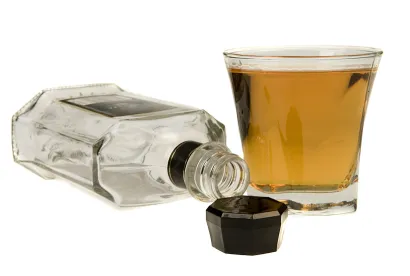Jack Daniel’s Properties, Inc. v. VIP Products LLC. (Docket 22-148)
On March 22, 2023, VIP Products LLC told the Supreme Court that its parody Bad Spaniels whiskey-bottle-shaped dog toys do not violate the Lanham Act because they poke fun at large companies that take themselves too seriously. Not only do they not confuse, but the First Amendment shields the toys from liability. Jack Daniel’s, the Petitioner, vehemently disagreed and argued that the dog toys, although concededly a parody, cause consumers confusion and therefore infringe Jack Daniel’s trademarks.
Based on the outcome, this case will likely have serious implications for either trademark owners or parodists who aim their parodic commentary at a trademark. On the one hand, if the Supreme Court sides with Jack Daniel’s, there may be a risk of trademark law encroaching on the free speech rights of parody artists such as those on Saturday Night Live. On the other hand, a decision in favor of VIP Products could leave trademark owners without recourse when another company uses an alleged parody or spoof of its mark to sell a competing good.
Background
In Jack Daniel’s Properties, Inc. v. VIP Products LLC, the Supreme Court was asked to decide whether a humorous use of another’s trademark is subject to the Lanham Act’s traditional likelihood-of-confusion analysis or instead receives heightened First Amendment protection from trademark-infringement claims.
A District Court found that Bad Spaniels “Silly Squeaker” dog toys would likely confuse consumers and enjoined VIP Products from selling them. On appeal, the Ninth Circuit reversed and held that the parody dog toys were expressive works and received heightened First Amendment protection from trademark infringement claims. Jack Daniel’s petitioned the Supreme Court to review the decision, which the Court granted in November 2022. At least thirty companies and organizations submitted amicus briefs, showing that the issue presented is one of importance and broad interest. The parties presented their oral arguments on March 22, 2023.
Oral Argument Recap
Jack Daniel’s began by arguing that the Lanham Act should control because the First Amendment provides no special protection for another’s trademark—even if that use is humor or parody. Jack Daniel’s further argued the Rogers v. Grimaldi test, which protects the use of trademarks in works of creative expression unless the plaintiff can show that the defendant’s use of the mark is either “not artistically relevant to the underlying work,” or “explicitly misleads consumers as to the source or content of the work"—should not control because the dog toys are not expressive, but just consumer goods. Simply because the dog toys, which bear a label reading “the Old No. 2, on your Tennessee Carpet,” are funny does not make them works of creative expression. As the attorney for Jack Daniel’s stated during the oral argument:
“Ha. Ha. Ha. Is not a standard under the Lanham Act.”
In response, VIP Products argued that the First Amendment freedom of speech begins with and includes the freedom to mock. Therefore, its parody of Jack Daniel’s should be protected by the First Amendment as an expressive work. Ultimately, the crux of VIP Products’ argument is that Jack Daniel’s is attempting to control speech by weaponizing the Lanham Act. As the attorney for VIP Products put it:
“In our popular culture, iconic brands are another type of celebrity. People are constitutionally entitled to talk about celebrities and yes, even make fun of them. Jack Daniel’s advertised in a self-serious way, that Jack is everyone’s friend. And Bad Spaniels is a parody playfully comparing Jack to man’s other best friend. It is clear in this case, that what Jack Daniel’s is complaining about is not Bad Spaniels as a designation of source, they are complaining about the speech, the parody, the comparison to dog poop.”
Throughout the oral arguments, the Justices engaged in a lively discussion with both sides and posed a range of hypotheticals to discern each Party’s position. For example, Justice Sotomayor and the attorney for Jack Daniels had a back-and-forth regarding the following hypothetical:
JUSTICE SOTOMAYOR: “An activist takes [o]ne of the political party’s trademark animal logos, and makes a T-shirt where the animal looks drunk, accompanied by its slogan, Time to Sober Up America, and they wear that proudly at a protest or here in court... She sells these T-shirts on Amazon. The political party gets a consumer survey purportedly showing that 15 percent, 20, 25, 10, whatever number we make up, okay, think the activist needs the party’s permission to copy the logo. So I’m a judge. I know what I would do. But tell me what you would do, and do they have to go through —a full trial under the Polaroid factors to decide this case?”
JACK DANIELS: “The fact that a product, including your T-shirt example, is funny or it has a parody is not relevant. What is extremely relevant is any character —”
JUSTICE SOTOMAYOR: “[i]s whether the person viewing it would get the joke.”
After more back and forth, Justice Sotomayor reinforced another point:
JUSTICE SOTOMAYOR: “They don’t need permission to make a political joke. They don’t need permission to make a parody.”
Justice Alito asked Jack Daniel’s whether any customers were actually confused, and walked through the hypothetical situation of a Jack Daniel’s CEO approving a product like what VIP Products depicts in its dog toys:
JUSTICE ALITO: “All right. Let me envision this scene. Somebody in Jack Daniel’s comes to the CEO and says, I have a great idea for a product that we’re going to produce. It’s going to be a dog toy, and it’s going to have a label that looks a lot like our label, and it’s going to have a name that looks a lot like our name, Bad Spaniels, and what’s going to be in —purportedly in this dog toy is dog urine. Do you think the CEO is going to say that’s a great idea, we’re going to produce that thing?”
Justice Alito later remarked that:
JUSTICE ALITO: “Well, I’m concerned about the First Amendment implications of your position.”
However, not all the Justices seemed so reluctant to accept Jack Daniel’s position. During VIP Products’ oral argument, Justice Kagan questioned:
JUSTICE KAGAN: “What is the parody here? Because maybe I just have no sense of humor, but —”
The question was followed by laughter in the courtroom, possibly indicating that Jack Daniel’s isn’t the only one who fails to see the humor in VIP Products’ dog toys.
A recording of the oral argument may be found here.
Takeaways
Both sides are seeking broad rulings. Jack Daniel’s wants the Court to remove the First Amendment from any Lanham Act analysis. VIP wants the Court to turn the First Amendment into a trump card. But, based on the briefing and oral arguments presented, it seems more likely that the Court lands somewhere in the middle, perhaps declining to find a blanket First Amendment defense for parody trademarks, but instead remanding with instructions that the District Court apply the two-part Rogers test. However, it is also unlikely that the Court fully sides with VIP Products because the dog toys are likely a commercial good as opposed to an expressive work.






 />i
/>i
